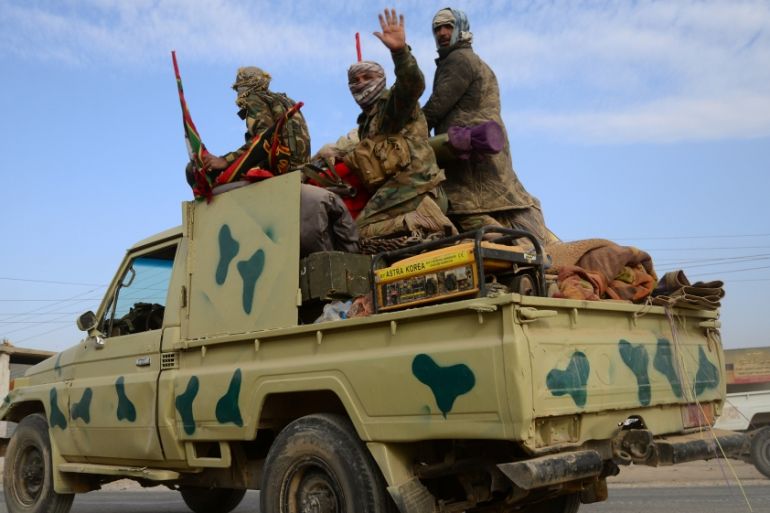The PMF in Iraq: Fight, then demobilise
A glorious chapter in Iraq’s military history doesn’t have to lead to oppression.

On November 26, the Iraqi parliament passed a bill recognising the Shia fighters, the Popular Mobilisation Forces (Hashd al-Shaabi, PMF).
The bill is not quite the breakthrough moment that many observers suggest: It mirrors language already enacted in an order issued by Prime Minister Haider al-Abadi in February 2016, which was leaked to the media. Also the bill was not endorsed by the Iraqi cabinet before being passed, so it is technically open to challenge in the Supreme Court and may still be modified by the cabinet.
Keep reading
list of 4 itemsWho was behind the DRC’s attempted coup? Were Americans involved?
Russia-Ukraine war: List of key events, day 816
International students risk immigration status to engage in Gaza protests
Even so, the passage of the bill with 208 votes for (out of 327, with none against) is an important reminder that Iraqis feel strongly about the PMF phenomenon and the pro-PMF politicians are an ambitious and powerful lobby in the parliament.
I have long argued that the PMF has to be recognised as a legitimate part of Iraq’s military history and a proud chapter for many Iraqis. When the Iraqi military failed in June 2014 it was the Shia paramilitaries that stepped up and created the confidence to prevent the Islamic State of Iraq and the Levant (ISIL) from taking Samarra and western Baghdad.
I was born in Britain, and we have our military legends too: The thousands of little boats that ordinary British people piloted across the English Channel to rescue our army from the Nazis at Dunkirk. This is why I can easily understand how the PMF are Iraq’s “Dunkirk moment”.
What I have also long said, however, it that there are two potential problems if the PMF are not demobilised after Mosul is recaptured.
First, the PMF may have done some great things in the war against ISIL, but they contain some of the most vicious and criminal militia groups in Iraq (PDF). Kataib Hezbollah and Asaib Ahl al-Haq are not just terrorist groups who killed hundreds of US and British soldiers. They also murdered thousands of Iraqi Sunni and Shia civilians, particularly in Baghdad, where Asaib Ahl al-Haq committed mass sectarian cleansing of Sunnis.
OPINION: Legalising PMF in Iraq – why it’s not all bad news
Second, even if the past records of these groups were deleted, many PMF components have frightening plans for Iraq in the future. Badr Organisation, Kataib Hezbollah and Asaib Ahl al-Haq have something very simple in common: they support the extension of the velayat-e faqih system of clerical rule from Iran into Iraq.
The right way to honour the PMF while still reducing the risk they pose is to demobilise them into the existing security forces under the Ministry of Defence and the Ministry of Interior.
This means not only do they have a commitment to overthrow parliamentary democracy and the constitution in Iraq, they don’t even want an Iraqi cleric on top. They take their orders from Iran.
There is a dichotomy here: Iraqi Shia are right to be proud of their role in stopping ISIL in 2014, but should also be fearful of what the PMF might become in the near future.
The right way to honour the PMF while still reducing the risk they pose is to demobilise them into the existing security forces under the Ministry of Defence and the Ministry of Interior.
The February executive order and the recent law are a good start. These documents assert the prime minister’s ultimate leadership of the PMF, call for its restructuring in keeping with national interests, and bring the movement and its leaders under the military code of justice and discipline.
It is right and fair that the PMF fighters (including thousands of Sunnis as well) get medical and logistical support plus salaries and pensions equivalent to other Iraqi soldiers. But Iraqis need to watch closely how these aims are achieved.
If the PMF gets these services through the security ministries, for instance through Ministry of Defence hospital arrangements, then this poses no risk. But it would be dangerous (and unnecessarily costly) if the PMF starts to build up a set of expensive parallel institutions more akin to Iran’s Islamic Revolutionary Guard Corps or Basij Forces, or Lebanon’s Hezbollah.
In Iran and Lebanon these forces have become more than security guardians. They are powerful political, voting and intimidation machines, and they have the ability to threaten even elected presidents (as the Revolutionary Guard did in Iran against President Mohammad Khatami in 1999).
OPINION: Iraq’s popular demobilisation
This is why Iraqis need to closely watch Iraq’s budgets to make sure the PMF do not get direct control of the resources that can turn them into a permanent anti-democratic, Iranian-controlled power base. This is why it is safest and best to demobilise the PMF into the existing ministry armed units.
If the PMF are allowed to grow out of control, it will be a sad corruption of their heroic stand in 2014 and could become yet another bitter memory for Iraqis. But if demobilisation occurs, the PMF will be proudly remembered as Iraq’s “Dunkirk moment”.
Michael Knights is the Lafer Fellow at the Washington Institute for Near East Policy. He specialises in the politics and security of Iraq. He has worked in every Iraqi province and most of the country’s hundred districts, including periods embedded with Iraq’s security forces.
The views expressed in this article are the author’s own and do not necessarily reflect Al Jazeera’s editorial policy.
